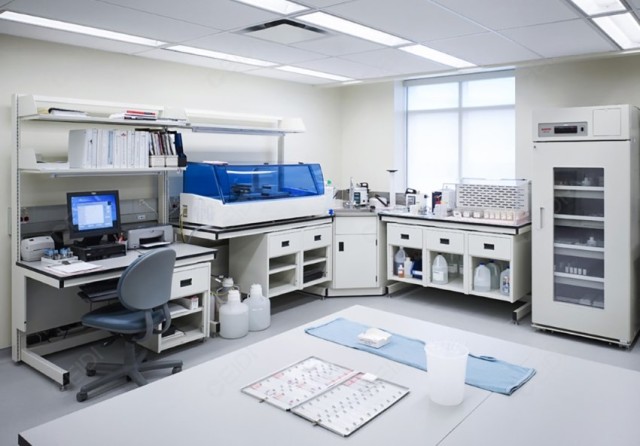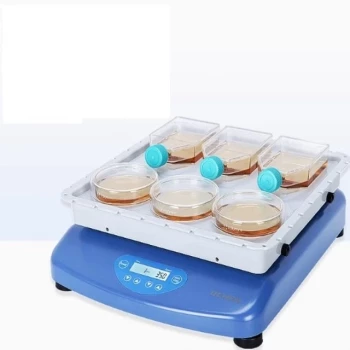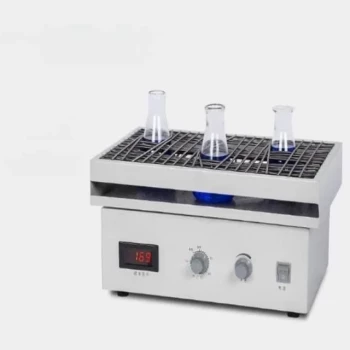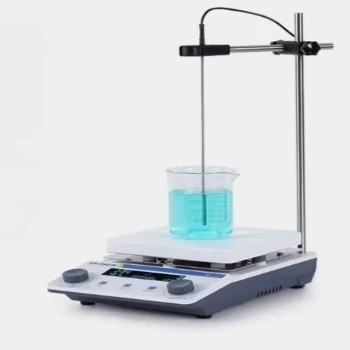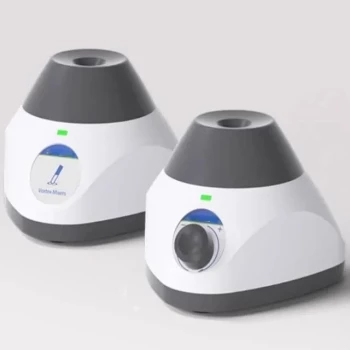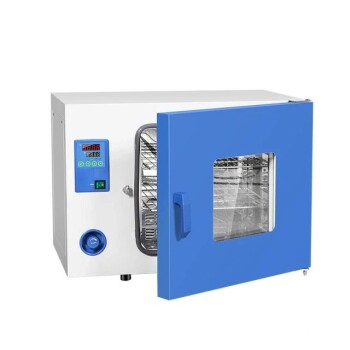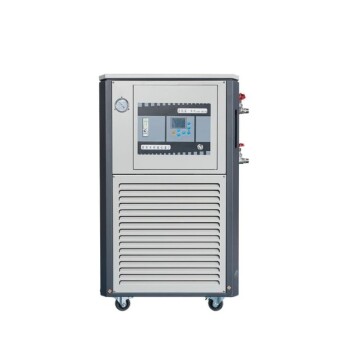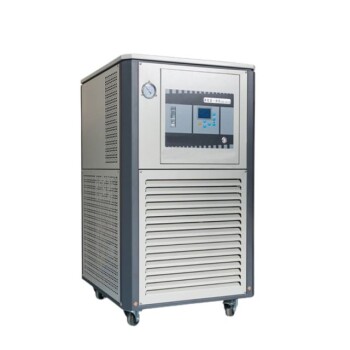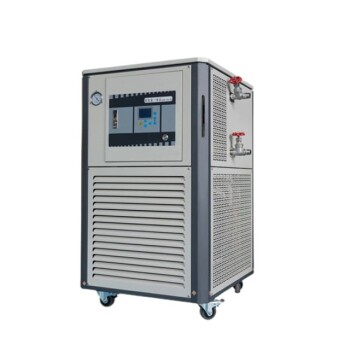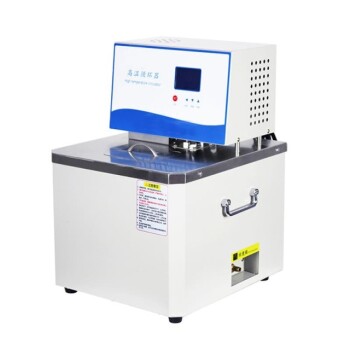온도 제어 인큐베이터
생화학 인큐베이터
생화학 인큐베이터에는 정교한 양방향 온도 제어 시스템이 장착되어 있어 냉장 및 가열 기능을 모두 사용할 수 있습니다. 이 이중 기능은 다양한 실험실 용도에 필수적인 정밀한 온도 조절을 보장합니다. 인큐베이터의 온도 조절 기능을 통해 일정한 조건을 유지할 수 있으므로 저온 항온 테스트, 배양 테스트 및 환경 테스트에 필수적인 장비입니다.

저온 항온 테스트에서 생화학 인큐베이터는 정확한 데이터 수집 및 분석에 필수적인 안정적인 미리 정해진 온도를 시료가 유지하도록 보장합니다. 배양 테스트의 경우, 배양기는 미생물의 성장과 증식을 위한 최적의 환경을 제공하여 미생물의 행동과 특성에 대한 상세한 연구를 용이하게 합니다. 또한 환경 테스트에서 인큐베이터는 다양한 환경 조건을 시뮬레이션하여 연구자들이 다양한 요인이 생물학적 과정에 어떤 영향을 미치는지 이해할 수 있도록 도와줍니다.
생화학 인큐베이터의 다목적성은 미생물학, 생화학, 환경 과학 등 다양한 과학 분야에 적용될 수 있다는 점에서 더욱 강조됩니다. 견고한 설계와 정밀한 제어 메커니즘으로 학술 및 산업 연구 환경 모두에서 필수적인 도구입니다.
곰팡이 인큐베이터
곰팡이 인큐베이터는 밀폐된 공간 내에서 환경 조건을 세심하게 제어하여 유기체와 식물의 성장을 촉진하도록 설계된 특수 실험실 기기입니다. 이러한 인큐베이터는 온도와 습도를 정밀하게 제어하는 것이 중요한 다양한 생물학 및 미생물학 연구 분야에 필수적입니다.

최적의 성장 조건을 조성하기 위해 곰팡이 인큐베이터에는 온도와 습도 수준을 미세 조정할 수 있는 첨단 시스템이 장착되어 있습니다. 이러한 정밀도는 일반적으로 4~6시간의 비교적 짧은 시간 내에 곰팡이 배양이 이루어질 수 있도록 하는 데 필수적입니다. 이러한 특정 조건을 설정하고 유지할 수 있는 능력은 성장 과정을 가속화할 뿐만 아니라 실험 결과의 균일성과 일관성을 보장합니다.
또한 곰팡이 배양기가 제공하는 폐쇄적인 환경은 연구 데이터의 무결성을 유지하는 데 가장 중요한 외부 요인으로부터의 오염을 방지하는 데 도움이 됩니다. 이러한 통제된 환경은 민감한 유기체 또는 무균 환경이 필요한 연구와 관련된 연구에서 특히 유리합니다.
요약하자면, 곰팡이 배양기는 실험실에서 없어서는 안 될 도구로, 정밀하게 제어된 조건에서 유기체와 식물을 배양할 수 있는 안정적이고 효율적인 방법을 제공하여 다양한 과학적 연구를 지원합니다.
이산화탄소 인큐베이터
이산화탄소 배양기는 세포와 조직의 체외 배양을 위해 특별히 설계된 첨단 실험실 기기입니다. 유기체 내 세포/조직의 자연적인 성장 환경을 세심하게 재현하여 증식 및 연구를 위한 최적의 조건을 조성합니다.

이 특수 인큐베이터는 정확한 온도와 습도 수준뿐만 아니라 조절된 이산화탄소 농도를 포함한 제어된 분위기를 유지합니다. 이는 세포의 생존과 성장에 필요한 pH 균형을 유지하는 데 매우 중요합니다. 이 장치에는 정교한 센서와 제어 시스템이 장착되어 있어 배양 중인 특정 유형의 세포 또는 조직에 대해 이러한 매개변수가 최적의 범위 내에서 안정적으로 유지되도록 보장합니다.
또한 이산화탄소 인큐베이터는 다른 실험실 장비와 함께 사용하여 생물학적 연구를 위한 종합적인 시스템을 구축하는 데 자주 사용됩니다. 예를 들어 자동 공급 시스템, 이미징 기술, 데이터 로깅 도구와 통합하여 세포 배양 연구에 대한 총체적인 접근 방식을 제공할 수 있습니다. 이러한 통합은 연구 프로세스의 효율성을 향상시킬 뿐만 아니라 실험 결과의 정확성과 신뢰성을 보장합니다.
요약하자면, 이산화탄소 배양기는 체외 세포 및 조직 배양을 위한 탁월한 정밀도와 제어 기능을 제공하는 실험실 장비의 필수 도구로 손꼽힙니다. 생명체의 복잡한 조건을 시뮬레이션할 수 있어 생명공학, 약학, 재생 의학 등의 분야 연구자에게 없어서는 안 될 필수 장비입니다.
전기 항온 인큐베이터
전기 항온 인큐베이터는 특히 의료 및 건강, 제약, 생화학, 농업 과학 등의 분야에서 과학 연구 및 산업 생산의 초석으로 자리 잡고 있습니다. 이 다목적 장비는 박테리아 배양, 발효 및 항온 테스트를 용이하게 하도록 세심하게 설계되어 다양한 생물체의 성공적인 배양 및 분석에 필수적인 정밀한 환경 조건을 보장합니다.

의료 및 보건 분야에서 전기 항온 배양기는 진단 테스트와 백신 개발에 필수적인 박테리아 배양의 성장과 유지에 중요한 역할을 합니다. 마찬가지로 제약 산업에서는 항생제 및 기타 의약 화합물 생산에 필요한 발효 과정을 지원합니다. 생화학 및 농업 과학 분야에서도 안정적인 온도를 유지하여 일관되고 신뢰할 수 있는 실험 결과를 얻을 수 있는 이점을 누릴 수 있습니다.
전기 항온 인큐베이터는 단순히 생물학적 샘플을 보관하는 수동적인 용기가 아니라, 연구 중인 유기체의 요구에 완벽하게 부합하는 조건을 보장하는 과학적 프로세스에 적극적으로 참여합니다. 이러한 정밀성은 첨단 온도 제어 메커니즘을 통해 달성되며, 외부 변동에 관계없이 일관된 환경을 유지할 수 있어 실험 결과의 재현성과 신뢰성을 향상시킵니다.
또한 온도 유지뿐만 아니라 빛, 습도, 가스 환경 제어 등 다양한 특수 배양 요구 사항도 지원합니다. 이러한 적응성 덕분에 전기 항온 인큐베이터는 정확하고 일관된 결과가 가장 중요한 현대 실험실에서 귀중한 도구가 될 수 있습니다.
특수 인큐베이터
광 인큐베이터
광 인큐베이터는 박테리아와 곰팡이를 포함한 다양한 미생물의 배양과 번식을 위해 설계된 특수 실험실 장비입니다. 온도 제어에만 의존하는 다른 인큐베이터와 달리 광 인큐베이터는 온도와 조명 제어를 모두 통합하여 미생물 성장을 위한 보다 포괄적인 환경을 제공합니다.

광 인큐베이터의 내부 탱크는 일반적으로 엔지니어링 플라스틱 또는 스테인리스 스틸로 제작됩니다. 이러한 소재 선택은 여러 가지 이유로 중요합니다:
-
엔지니어링 플라스틱: 내화학성이 뛰어나 화학 반응의 위험 없이 다양한 미생물 배양을 담는 데 이상적입니다. 또한 세척 및 유지 관리가 쉬운 매끄러운 표면을 제공하여 배양액 간의 교차 오염을 방지하는 데 필수적입니다.
-
스테인리스 스틸: 내구성과 부식에 강한 것으로 잘 알려진 스테인리스 스틸은 실험실 환경에서 자주 사용하는 인큐베이터의 혹독한 사용 환경을 견딜 수 있도록 해줍니다. 또한 인큐베이터 내부의 온도를 일정하게 유지하는 데 필수적인 효율적인 열 분배를 용이하게 합니다.
이러한 소재는 인큐베이터의 수명과 기능을 보장할 뿐만 아니라 배양 과정의 전반적인 무균성과 효율성에도 기여합니다.
인공 기후 챔버
인공 기후 챔버는 다양한 생물학적 및 환경적 연구를 촉진하는 다목적 실험실 도구로 사용됩니다. 주요 용도는 다음과 같습니다. 발아 및 묘목 재배 자연 생육 환경을 모방한 제어된 조건을 제공하여 식물 번식 성공률을 높이는 데 사용됩니다. 또한 이 챔버는 다음과 같은 분야에서도 유용하게 사용됩니다. 조직 및 미생물 배양 다양한 생물 표본의 성장을 지원하는 안정적이고 멸균된 환경을 제공합니다.

곤충과 작은 동물을 연구하는 연구자를 위한 곤충과 작은 동물 을 연구하는 연구자에게 인공 기후 챔버는 다양한 기후 조건을 시뮬레이션할 수 있는 제어된 서식지를 제공하여 행동 및 생리적 반응을 관찰하고 분석하는 데 도움을 줍니다. 이 기능은 다음과 같이 확장됩니다. 물 분석 수질 평가의 중요한 변수인 생화학적 산소 요구량(BOD)을 측정하는 데 챔버가 사용됩니다.
이러한 특정 용도 외에도 인공 기후 챔버는 다음과 같은 용도로 사용됩니다. 일반 인공 기후 테스트 에서 다양한 환경 조건을 재현하여 다양한 기후 시나리오에서 재료, 제품 및 시스템의 성능과 내구성을 평가합니다. 이러한 폭넓은 활용성 덕분에 학술 연구와 산업 응용 분야에서 없어서는 안 될 자산이 되었습니다.
항온항습 챔버
항온항습 테스트 챔버는 다양한 환경 조건을 시뮬레이션할 수 있도록 설계된 재료 과학 및 엔지니어링 분야의 필수 도구입니다. 연구자들은 이 챔버를 통해 다양한 온도 및 습도 설정에서 재료의 성능을 평가하여 열, 추위, 건조 및 습기와 같은 조건에 대한 복원력을 테스트할 수 있습니다.

과학자들은 재료를 제어된 환경 스트레스에 노출시켜 실제 시나리오에서 재료가 어떻게 작동할지 예측할 수 있으며, 이는 자동차에서 항공 우주에 이르는 다양한 산업에 매우 중요합니다. 예를 들어, 실험실의 극한의 열과 습도 조건에서 잘 작동하는 소재는 열대 기후나 직사광선에 장시간 노출되어도 무결성을 유지할 가능성이 높습니다.
항온항습 챔버의 다목적성은 재료 테스트에만 국한되지 않습니다. 미생물, 식물 및 기타 생물 표본의 성장과 연구에 필요한 환경 조건을 시뮬레이션할 수 있는 생물학적 연구에도 사용됩니다. 이러한 기능은 농업, 제약 및 환경 과학과 같은 분야에서 귀중한 자산이 됩니다.
요약하자면 항온항습 시험 챔버는 단순한 장비가 아니라 여러 과학 분야에서 중요한 연구 및 개발 활동을 촉진하는 정교한 도구입니다.
미생물 배양기
미생물 배양기는 박테리아, 곰팡이, 식물/동물 세포 등 다양한 미생물을 배양하도록 설계된 특수 박스형 장치입니다. 이 다용도 도구는 생물학적 연구에서 이러한 유기체에 필요한 최적의 성장 조건을 시뮬레이션하는 데 필수적입니다.

온도, 습도, 빛, 이산화탄소 수준, pH와 같은 주요 환경 매개변수는 인큐베이터 내에서 세심하게 제어됩니다. 이러한 정밀한 조절을 통해 내부 환경이 연구 중인 유기체의 자연 서식지를 모방하여 성장과 번식을 촉진할 수 있도록 합니다. 예를 들어 박테리아는 일반적으로 따뜻하고 습한 환경에서 잘 자라는 반면 곰팡이는 특정 습도 수준과 조명 조건이 증식하는 데 필요할 수 있습니다.
미생물 배양기의 안정적이고 통제된 환경을 유지하는 기능은 일관된 결과가 필요한 실험에 매우 중요합니다. 온도가 박테리아 성장에 미치는 영향이나 이산화탄소 수준이 식물 세포 배양에 미치는 영향을 연구할 때 미생물 배양기는 이러한 조사를 위한 신뢰할 수 있는 플랫폼을 제공합니다.
요약하자면, 미생물 배양기는 연구자들이 정밀하게 제어된 조건에서 다양한 미생물을 배양하고 연구할 수 있는 수단을 제공하는 실험실 환경의 초석과 같은 역할을 합니다.
혐기성 인큐베이터
혐기성 인큐베이터는 산소가 없는 환경에서 번성하는 미생물인 혐기성 미생물의 배양을 위해 특별히 설계되었습니다. 이러한 인큐베이터는 챔버 내의 산소 수준을 체계적으로 제거하거나 감소시킴으로써 산소가 없는 통제된 환경을 조성합니다. 이는 산소를 배제한 가스 혼합물을 사용하거나 진공 시스템을 사용하여 챔버에서 산소를 제거하는 등 다양한 방법을 통해 달성됩니다.

혐기성 인큐베이터는 엄격한 혐기성 조건을 제공할 뿐만 아니라 혐기성 유기체의 성장과 생존에 필수적인 일정한 온도를 유지합니다. 온도 제어 시스템은 이러한 유기체의 자연 서식지를 모방하여 내부 환경이 안정적으로 유지되도록 합니다. 혐기성 조건과 일정한 온도라는 이중 기능 덕분에 혐기성 인큐베이터는 혐기성 박테리아 및 기타 미생물 연구가 우선시되는 실험실에서 필수 불가결한 장비입니다.
혐기성 인큐베이터의 설계는 체계적이고 과학적이며, 챔버 내 조건을 정밀하게 제어하고 모니터링할 수 있는 잘 조직된 작업 공간을 특징으로 합니다. 여기에는 산소와 온도 수준을 지속적으로 모니터링하고 조절하는 첨단 센서와 제어 시스템이 포함되어 있어 배양 중인 유기체에 최적의 조건을 유지할 수 있습니다. 또한 체계적인 레이아웃은 사용 편의성을 높여 연구자들이 섬세한 혐기성 환경에 대한 방해를 최소화하면서 효율적으로 실험을 수행할 수 있도록 도와줍니다.
진동 인큐베이터
진동 인큐베이터는 생물학적 샘플을 배양하기 위해 설계된 특수 실험실 장비입니다. 정적인 환경을 유지하는 기존 인큐베이터와 달리 진동 인큐베이터는 자연 서식지의 물의 움직임과 같은 자연 조건을 시뮬레이션하기 위해 부드러운 흔들림 동작을 통합합니다. 이러한 움직임은 특정 유형의 세포, 특히 영양분 분배와 노폐물 제거를 촉진하기 위해 교반이 필요한 세포의 성장과 발달에 매우 중요합니다.

진동 인큐베이터의 주요 기능은 생물학적 샘플의 성장을 지원하는 제어된 환경을 제공하는 것입니다. 여기에는 세포의 생존과 증식에 필수적인 정확한 온도, 습도 및 CO2 수준을 유지하는 것이 포함됩니다. 진동 기능은 인큐베이션 프로세스에 복잡성을 더하여 샘플을 최적의 조건으로 유지할 뿐만 아니라 부드럽고 일관된 움직임을 보장합니다.
진동 인큐베이터는 미생물학, 세포 생물학, 생명공학 등의 분야에서 특히 유용합니다. 박테리아, 곰팡이 및 동적 환경의 혜택을 받거나 동적 환경이 필요한 기타 미생물을 배양하는 데 자주 사용됩니다. 진동 주파수와 진폭을 제어할 수 있는 기능을 통해 연구자는 배양 조건을 샘플의 특정 요구에 맞게 조정하여 실험의 정확성과 신뢰성을 높일 수 있습니다.
요약하자면 진동 배양기는 단순히 정적인 환경을 제공하는 것이 아니라 생물학적 샘플의 성장을 촉진하기 위해 자연 조건을 시뮬레이션하는 동적 시스템입니다. 고유한 기능 덕분에 다양한 실험실 환경, 특히 세포와 환경 간의 상호 작용이 연구 결과에 중요한 역할을 하는 곳에서 없어서는 안 될 필수 도구입니다.
관련 제품
- 실험실용 진동 궤도 교반기
- 실험실 다기능 소형 속도 조절 수평 기계식 흔들기
- 실험실 소형 정온 가열 교반기
- 효율적인 샘플 혼합 및 균질화를 위한 실험실 디스크 회전 믹서
- 실험실용 고압 증기 멸균기 수직 오토클레이브
